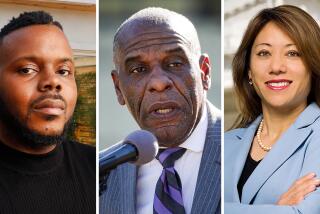A common-sense educator
- Share via
It’s not entirely clear why the framers of California’s Constitution decided that the state superintendent of public instruction should be elected rather than appointed. It is especially mystifying considering that the state Board of Education, which sets policy and enacts regulations, is appointed, while the elected superintendent is tasked with carrying out those policies — the opposite of how things are done in all local school districts. In addition, the state has an appointed secretary of education, whose main job is to advise the governor.
In other words, if the governance structure for California schools made more sense, we wouldn’t be endorsing a candidate for state superintendent. But there it is: The nonpartisan position is important — it calls for overseeing the state’s single most expensive responsibility — and there are 12 candidates vying for it. The superintendent has broad powers to intervene in failing schools, set and enforce curriculum standards and interpret education law — such as how hard standardized tests should be, what material they should cover and how much leeway to give to home-schoolers.
Most of the candidates are underqualified, lacking education credentials or policy experience or both. Of the three strongest — including state Sen. Gloria Romero (D-Los Angeles) and Assemblyman Tom Torlakson (D-Antioch) — retired school superintendent Larry Aceves strikes us as best suited to manage the state’s large education bureaucracy and to bring reason and optimism to schools that have been torn apart by shrinking budgets and battles over whether and how much they should be punished for falling short of achievement goals.
Having spent more than a decade as a superintendent in small school districts — and several years as an assistant superintendent in a mid-size district — Aceves comprehends the day-to-day reality within school walls. As a former president of the Assn. of California School Administrators, he has experience working with state officials and organizations. His common-sense approach to what ails schools brings a breath of fresh air to today’s atmosphere of divisive and unhelpful educational rhetoric.
Aceves identifies the key reforms necessary both to help public schools and to hold them accountable in reasonable ways. Like him, we believe that good education starts with good teachers and principals, which means higher standards and better training for both. Aceves correctly goes to the source on this issue: California cannot reform its schools until it reforms its teachers colleges, where the curriculum tends to be heavy on theory and light on practical classroom training. He’s also right about the need for more peer evaluation and coaching. Teachers learn best from other teachers.
Even great teachers, however, cannot entirely make up for outside factors that keep children from succeeding. For example, Aceves points out that the children of migrant workers enter school with half the vocabulary of their peers; vocabulary size is one of the chief indicators of a student’s future success. Aceves sensibly suggests that existing resources for parent outreach should be targeted to better training of parents — starting at their children’s birth.
At the same time, he has no patience for schools that fail to improve. The state Education Department has long had the power to intervene in persistently low-performing schools but has taken too soft an approach. It spends thousands of dollars on drawing up plans for each school, which are then usually ignored. Aceves would push the department to intervene earlier and more forcefully. He also would require better evaluation of and documentation on teacher performance, calling it “nonsense” that districts cannot fire their most ineffective teachers. And he would push the Legislature to grant him the authority to suspend provisions in labor contracts that interfere with learning.
It’s a strong platform, and Aceves strikes us as having both the expertise and the people skills to carry off much of it. We would have liked to see heftier management experience on his resume, at larger school districts, but his understanding of education issues and his obvious problem-solving skills and deft communication place him clearly at the top of the candidate list. We’re eager to see where he can lead California’s schools in the next several years of trying times.
More to Read
Sign up for Essential California
The most important California stories and recommendations in your inbox every morning.
You may occasionally receive promotional content from the Los Angeles Times.










